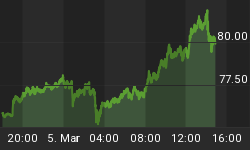Economic sentiment rose to a 28 month high in Europe after the panic sell off earlier this year when the Euro collapsed. A major rally has ensued after the most severe financial panic in the Euro's history. Now the rally is pushing higher, but have the concerns dissipated? I am extremely concerned about this rally off of June lows for several reasons. I do not believe that the economies in Spain, Portugal and Greece will be saved without major restructuring, and the chance of credit defaults are extremely high. A strong Euro hurts European companies that are trying to export goods. It harms companies' revenues and affects employment. Spain is now suffering from high unemployment, a real estate crash and the very likely chance of a credit downgrade.
It is interesting to observe the dichotomy between Europe's handling of the debt crisis versus the United States. While Spain, Portugal and Greece have been forced to cut spending, President Obama has increased unemployment benefits and expanded social programs. The U.S. is estimating a $1.47 trillion deficit this fiscal year ending September 30, and $1.42 trillion in 2011. The U.S. is spending frivolously while the Europeans are taking aggressive steps to cut expenditures, which is weighing heavily on consumer confidence and economic growth. Over the past couple of weeks when concerns of a double dip increased, Ben Bernanke has discussed additional quantitative easing and fiscal stimulus to prevent another financial collapse while Trichet is forcing governments to cut expenditures to stem off the aggressive selling of the Euro and the concerns of a breakup of the European Union. As you can see, there is a global effort to prevent economic collapse and the manipulation at play is obvious.
I don't believe this will continue much longer. The Europeans will have to follow the United States' lead and devalue their currency in order to prevent political unrest and the breakup of the European Union. I suspect the rally in the Euro to come to an end soon, as the austerity measures imposed will have to be lightened. Spain has millions of people out of work already-over 20% of their population. Let's not ignore what can happen in Europe when unemployment rates skyrocket.
The Euro's rally and the decline in the dollar have been good for U.S. equities which were breaking into new lows in early June, with a break of 1040 on the S&P 500. The S&P has moved higher and is on the verge of breaking a major resistance point of 1130.
Comparing the Dollar to the Euro, the relative trend has just hit an important area of support at the 50% fibonacci retracement and the dollar has just hit its 200 day moving average. Due to the oversold condition of the Dollar and the overbought condition of the Euro plus important support for the dollar at the 200 day and 50% fibonacci retracement on the relative strength chart, I suspect an upcoming correction in the Euro.

Further bailouts in Europe, credit downgrades and defaults are expected to continue into the second half of 2010, which will see selling pressure on the Euro. These events could push those seeking a safe haven away from the Euro. In the past, that safe haven has been the Dollar and treasuries, but if you can tell by this game, there is only so much back and forth that can take place before the global currency crisis is revealed. At that time, true money that translates into hard assets will be extremely valued.
















